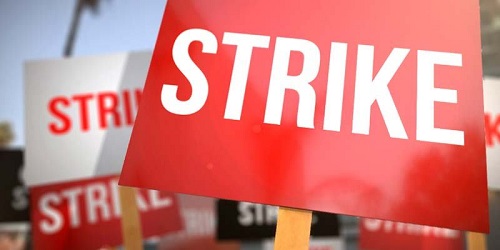A nationwide strike by the Ghana Registered Nurses and Midwives Association (GRNMA) has disrupted healthcare delivery across public hospitals, prompting the government to redirect patients to selected clinics in an attempt to keep services running.
On Tuesday, June 10, 2025, the Minister for Government Communications, Mr Felix Kwakye Ofosu, announced on Channel One TV that the Ministry of Health had published a list of clinics unaffected by the strike. These include private facilities and some public health centres that are still operating.
“The Health Minister has published a list of healthcare facilities to help guide patients to where services are still available,” Mr Ofosu said.
His comments came amid mounting pressure on the government to address the growing crisis, with outpatient departments and wards in many public hospitals largely deserted.
Now in its second week, the strike follows the government’s failure to implement the 2024 Collective Agreement. The agreement includes provisions for a 13th-month salary, fuel allowances, and incentives for rural postings.
Mr Ofosu said government projections indicated it would cost about GH¢2 billion annually to meet the demands, a figure that had not been included in the 2025 budget.
“Unplanned spending is what led to past economic challenges,” Mr Ofosu said. “We must find a solution that protects the economy while addressing the concerns of the nurses.”
To address the shortfall in personnel, the Ministry of Health has appealed to retired nurses and midwives to offer temporary support.
According to Mr Ofosu, district health directorates are coordinating their deployment. He emphasised that this is only a stopgap measure and not a long-term response to the strike.
“This is just to safeguard patients during this difficult period,” he added.
The reliance on retired staff has stirred debate, with critics questioning whether it undermines the nurses’ demands. Still, some nurses have remained at post despite the strike, and Mr Ofosu acknowledged their efforts.
The strike's effects have been especially severe in some regions. At the Ho Teaching Hospital, several wards have been shut. In response, private facilities like Royal Hospital are handling more patients than usual, and their nurses are working longer hours.
“We’re seeing 20 to 25 deaths daily due to this crisis,” a GRNMA representative claimed, underscoring the urgency of the situation.
Mr Ofosu said the government was hopeful that talks would resume soon. He noted that negotiations with labour unions tend to evolve over time.
According to him, the Ministry of Finance and the Fair Wages and Salaries Commission have been tasked with preparing an implementation plan that could serve as a basis for further dialogue.

